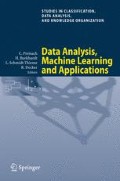Abstract
Multiple Imputation is a frequently used method for dealing with partial nonresponse. In this paper the use of finite Gaussian mixture models for multiple imputation in a Bayesian setting is discussed. Simulation studies are illustrated in order to show performances of the proposed method.
Access this chapter
Tax calculation will be finalised at checkout
Purchases are for personal use only
Preview
Unable to display preview. Download preview PDF.
References
DIEBOLT, J. and ROBERT, C.P. (1994): Estimation of finite mixture distributions through Bayesian sampling. Journal of the Royal Statistical Society B, 56, 363-375.
DI ZIO, M., GUARNERA, U. and LUZI, O. (2007): Imputation through finite Gaussian mix-ture models. Computational Statistics and Data Analysis, 51, 5305-5316. KOTZ, S., BALAKRISHNAN, N. and JOHNSON, N.L. (2000): Continuous multivariate dis-tributions. Vol.1, 2nd ed. Wiley, New York.
LITTLE, R.J.A. and RUBIN, D.B. (2002): Statistical analysis with missing data. Wiley, New York.
MENG, X.L. (1994): Multiple-imputation inferences with uncongenial sources of input (with discussion). Statistical Science, 9, 538-558.
PADDOCK, S.M. (2002): Bayesian nonparametric multiple imputation of partially observed data with ignorable nonresponse. Biometrika, 89, 529-538.
RICHARDSON, S. and GREEN, P.J. (1997): On Bayesian analysis of mixtures with an un-known number of components.Journal of the Royal Statistical Society B, 59, 731-792.
RUBIN, D.B. (1987): Multiple imputation for nonresponse in surveys. Wiley, New York.
SCHAFER, J.L. (1997): Analysis of incomplete multivariate data. Chapman & Hall, London.
STEPHENS, M. (2000): Bayesian analysis of mixture models with an unknown number of components-an alternative to reversible jump methods. Annals of Statistics, 28, 40-74.
TANNER, M.A. and WONG, W.H. (1987): The calculation of posterior distribution by data augmentation (with discussion). Journal of the American Statistical Association, 82, 528-550.
Author information
Authors and Affiliations
Editor information
Editors and Affiliations
Rights and permissions
Copyright information
© 2008 Springer-Verlag Berlin Heidelberg
About this paper
Cite this paper
Di Zio, M., Guarnera, U. (2008). On Multiple Imputation Through Finite Gaussian Mixture Models. In: Preisach, C., Burkhardt, H., Schmidt-Thieme, L., Decker, R. (eds) Data Analysis, Machine Learning and Applications. Studies in Classification, Data Analysis, and Knowledge Organization. Springer, Berlin, Heidelberg. https://doi.org/10.1007/978-3-540-78246-9_14
Download citation
DOI: https://doi.org/10.1007/978-3-540-78246-9_14
Publisher Name: Springer, Berlin, Heidelberg
Print ISBN: 978-3-540-78239-1
Online ISBN: 978-3-540-78246-9
eBook Packages: Mathematics and StatisticsMathematics and Statistics (R0)

